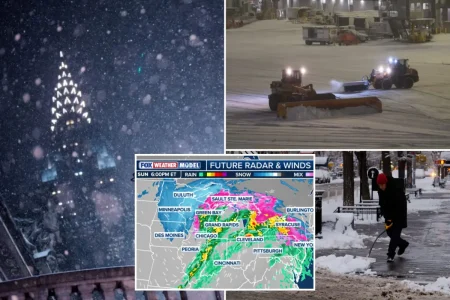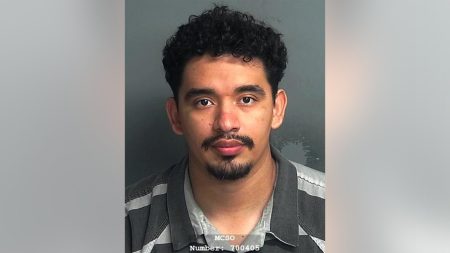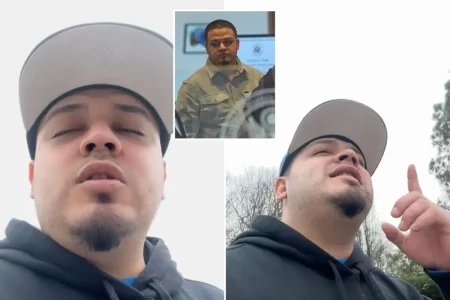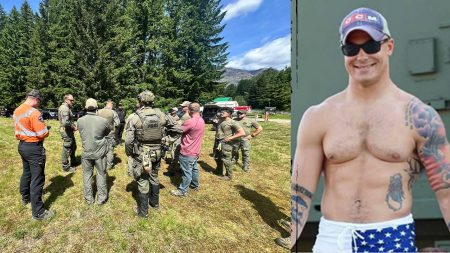Tragedy at Heaton Park: Investigation Reveals Complex Circumstances in Synagogue Deaths
Police Gunfire Confirmed in Fatal UK Synagogue Incident
In a somber development that has sent shockwaves through both religious and law enforcement communities, officials have confirmed that one of the fatalities in the recent tragedy at Heaton Park Congregation synagogue in northwestern England resulted from police gunfire. The revelation adds a layer of complexity to an already sensitive investigation that has drawn national attention and raised questions about security protocols at places of worship across the United Kingdom.
The incident, which unfolded in the normally peaceful community nestled in Greater Manchester, has prompted a multi-agency investigation as authorities work to piece together the precise sequence of events that led to multiple deaths. According to senior police officials speaking at a press conference yesterday, forensic evidence and preliminary ballistic reports indicate that at least one of the deceased individuals sustained fatal injuries from a round discharged by a responding officer. “We can confirm that following extensive forensic analysis, one of the casualties at Heaton Park synagogue was struck by police ammunition,” stated Detective Chief Superintendent Eleanor Walsh of the Greater Manchester Police. “This finding is preliminary, and we are committed to a thorough and transparent investigation to determine all circumstances surrounding this tragic event.”
Community Response and Interfaith Solidarity
The Jewish community in northwestern England has responded with both grief and resilience following the incident. Heaton Park Congregation, established over seven decades ago, has long been a cornerstone of Jewish life in the region, serving as both a spiritual home and community center for hundreds of families. Rabbi Daniel Silverman, a community leader though not affiliated with the affected synagogue, expressed the collective sentiment: “Our community stands united in mourning. While we seek answers about how this tragedy unfolded, we are grateful for the outpouring of support from people of all faiths.” Interfaith solidarity has emerged as a powerful response, with leaders from Christian, Muslim, Sikh, and Hindu communities organizing vigils and offering support services to those affected.
Local resident Sarah Goldstein, who lives near the synagogue, described the aftermath as “a community in shock, but also a community determined to support one another.” Community centers throughout Manchester have established counseling services for witnesses and those affected by the incident. Meanwhile, security has been visibly enhanced at religious institutions throughout the region, with police patrols increased and community volunteer security groups mobilizing additional resources. The Home Office has reportedly expedited reviews of security protocols for places of worship nationwide, with special attention to vulnerable communities that may face heightened threats.
Investigation Complexities and Police Response
The Independent Office for Police Conduct (IOPC) has launched a mandatory investigation into the police-involved shooting aspect of the case, as is standard procedure when law enforcement actions result in death. “We understand the public’s concern when a police operation results in fatalities,” said IOPC Director Michael Thompson. “Our investigation will be comprehensive, examining officer training, tactical decisions made during the response, and compliance with protocols for armed operations.” This investigation runs parallel to the broader criminal inquiry into the events that precipitated police involvement at the synagogue in the first place.
Law enforcement sources, speaking on condition of anonymity due to the sensitive nature of the ongoing investigation, indicated that officers responded to reports of an armed threat at the synagogue during a time when numerous worshippers were present. The rapid response team reportedly encountered a volatile situation that required split-second decision-making. Assistant Chief Constable Victoria Williams emphasized that the officer involved has been placed on administrative duties pending the investigation’s outcome, but stressed that “our officers faced extraordinary circumstances requiring immediate action to protect lives.” Police officials have declined to release specific details about the total number of casualties or the identities of those involved, citing both investigative integrity and family notification protocols. However, they confirmed that no further suspects are being sought in connection with the initial threat that prompted the police response.
Political Reaction and Policy Implications
The incident has reverberated through Britain’s political landscape, with the Prime Minister visiting Manchester to meet with community leaders and pledge government support for both the investigation and healing process. Speaking outside 10 Downing Street, the Prime Minister called the events “a tragedy that touches us all” and promised “a thorough examination of what occurred and what lessons must be learned.” Opposition leaders have largely avoided politicizing the incident, instead focusing on messages of unity and calls for comprehensive support for the affected community.
The tragedy has, however, inevitably reignited debates about several policy areas, including armed police response protocols, security funding for religious institutions, and approaches to combating religious hatred. Home Secretary Jonathan Barrett announced the formation of a special committee to review government programs supporting security at places of worship, noting that “we must ensure that every community feels safe in their places of prayer and gathering.” The announcement comes amid statistics showing a concerning rise in religiously motivated hate incidents across the UK in recent years. Community safety experts have pointed to the need for balanced approaches that enhance security without creating fortress-like atmospheres that might detract from the welcoming nature of religious spaces.
Looking Forward: Healing and Prevention
As the investigation continues, attention is gradually turning to the long-term healing process and preventative measures for the future. Mental health professionals specializing in trauma response have highlighted the importance of sustained support for those affected, including witnesses, first responders, and the broader community. Dr. Amina Khan, a trauma specialist working with families in Manchester, noted that “the ripple effects of such events extend far beyond immediate victims, affecting community cohesion and sense of safety in profound ways that may take years to fully address.”
The Heaton Park tragedy has also catalyzed important conversations about community resilience and preparedness. Religious leaders from various faiths have begun collaborative discussions about shared security concerns and best practices, recognizing that threats to any religious community represent threats to religious freedom more broadly. Educational initiatives aimed at promoting interfaith understanding have gained renewed attention, with local schools implementing programs designed to combat prejudice and build cross-cultural relationships from an early age. As Rabbi Silverman reflected, “From this darkness, we must find paths toward greater understanding and unity. That would be the most meaningful tribute to those whose lives were cut short.” While the full details of the Heaton Park incident continue to emerge through official investigations, the community’s response demonstrates a determination to emerge stronger and more united from this profound tragedy.










